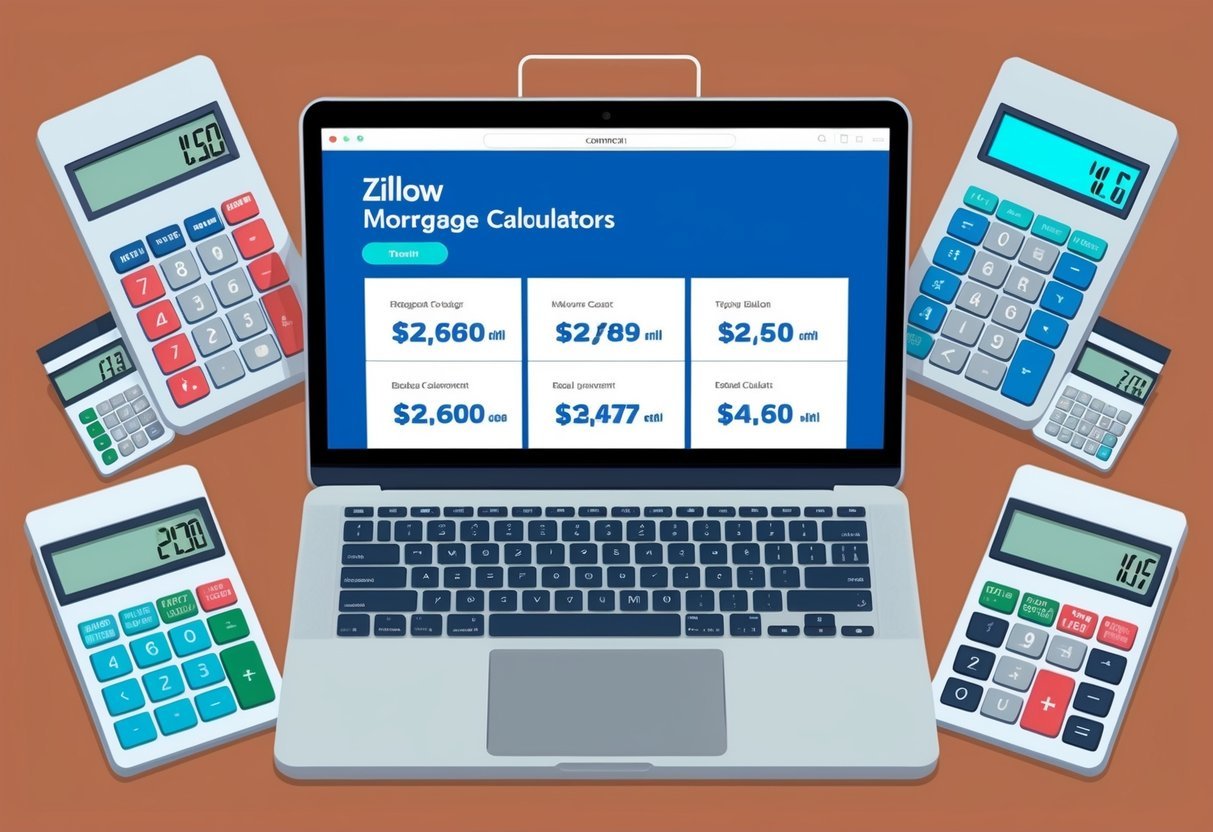Real estate investing can be a lucrative way to build wealth, but it requires careful analysis and calculation.
To make informed decisions, investors need accurate tools to evaluate potential properties and predict returns.
Real estate investment calculators are essential for crunching the numbers and comparing different opportunities.

By using the right calculators, you can quickly assess key metrics like cash flow, return on investment, and capitalization rates. These tools help streamline the analysis process, allowing you to focus on finding great deals.
With several options available online, it’s worth bookmarking a few reliable calculators to reference as you evaluate properties and grow your real estate portfolio.
1) BiggerPockets Rental Property Calculator
The BiggerPockets Rental Property Calculator is an essential tool for real estate investors.
This user-friendly calculator helps you evaluate the profitability and potential returns of rental properties.
You can input various details about a property, including purchase price, loan terms, and expected rental income.
The calculator then generates comprehensive reports on cash flow, return on investment, and other key metrics.
One of the calculator’s strengths is its ability to factor in operating expenses.
You can account for property taxes, insurance, maintenance costs, and more to get a realistic picture of your potential profits.
The tool also allows you to analyze different scenarios.
You can adjust variables like rental rates or vacancy rates to see how they impact your bottom line.
This feature helps you make informed decisions and prepare for various market conditions.
BiggerPockets offers both free and premium versions of the calculator.
The free version provides basic analysis, while the premium version unlocks additional features and more detailed reports.
By using this calculator, you can quickly assess multiple properties and compare their potential returns.
This efficiency can give you an edge in competitive real estate markets.
Remember that while the calculator is a powerful tool, it’s just one part of your investment strategy.
Always combine its insights with thorough research and professional advice when making real estate decisions.
2) Real Estate ABC ROI Calculator
The Real Estate ABC ROI Calculator is a valuable tool for investors looking to assess the potential returns on their property investments.
This calculator helps you determine the Return on Investment (ROI) for various real estate scenarios.
You can input key financial data such as purchase price, down payment, closing costs, and expected rental income.
The calculator then processes this information to provide you with a clear picture of your potential ROI.
One of the strengths of this calculator is its ability to factor in ongoing expenses like property taxes, insurance, and maintenance costs.
By including these elements, you get a more accurate representation of your investment’s profitability.
The Real Estate ABC ROI Calculator also allows you to adjust for different financing options.
You can explore how various mortgage terms and interest rates might impact your returns.
This feature enables you to make more informed decisions about your investment strategy.
Another useful aspect is the ability to project your ROI over different time periods.
You can see how your investment might perform in the short term versus the long term, helping you align your property choices with your financial goals.
By calculating the ROI on potential investments, you can compare different properties more effectively.
This tool empowers you to identify the most promising opportunities in your real estate portfolio.
3) Mortgage Calculators on Zillow

Zillow offers several useful mortgage calculators to help you make informed real estate investment decisions.
These tools can provide valuable insights into your potential property purchases.
The standard mortgage calculator allows you to estimate your monthly payments.
You can input the home price, down payment, loan term, and interest rate to get a breakdown of your costs.
For those considering refinancing, Zillow’s refinance calculator can help determine if it’s a smart financial move.
It compares your current mortgage with potential new loan terms.
You can also explore different scenarios with these calculators.
Adjust variables like down payment amounts or interest rates to see how they affect your monthly payments and long-term costs.
Zillow’s calculators take into account factors such as property taxes, homeowners insurance, and private mortgage insurance.
This gives you a more comprehensive view of your potential expenses.
Remember that these calculators are tools for estimation.
They can help you get a general idea of costs, but consulting with a financial advisor is recommended for major investment decisions.
By using Zillow’s mortgage calculators, you can better understand the financial implications of your real estate investments.
This knowledge will help you make more confident and informed choices in your property ventures.
4) Rentometer

Rentometer is an invaluable tool for real estate investors looking to make informed decisions about rental properties.
This online calculator helps you determine fair market rents in specific areas.
By entering an address and basic property details, you can quickly compare rent prices for similar properties in the neighborhood.
This information is crucial when setting competitive rental rates or evaluating potential investments.
Rentometer offers both free and paid versions.
The free option provides a basic rent comparison, while the premium version unlocks more detailed reports and analysis.
One of Rentometer’s standout features is its interactive maps, which visually represent rental data for the searched property and surrounding area.
This makes it easier to spot trends and patterns in local rental markets.
You can use Rentometer to assess the potential cash flow of a property before purchase.
By comparing your expected rental income to local averages, you’ll gain insight into whether a property is likely to generate positive returns.
For new investors, Rentometer serves as an excellent starting point to understand rental markets.
It can help you avoid common pitfalls and make more confident decisions when entering the world of real estate investing.
Remember to use Rentometer in conjunction with other research methods for a comprehensive view of potential investments.
While it’s a powerful tool, it should be part of a broader strategy for successful real estate investing.
5) All Property Management ROI Calculator

The All Property Management ROI Calculator is a valuable tool for real estate investors.
This calculator helps you determine the potential return on investment for rental properties.
To use this calculator effectively, you’ll need to gather some key information.
This includes the property’s purchase price, expected rental income, and estimated expenses.
Having these figures at hand will ensure more accurate results.
The calculator takes into account various factors that influence ROI.
These include property appreciation, which typically ranges from 3-5% annually in stable markets.
It also considers your mortgage terms and operating expenses.
One of the strengths of this calculator is its simplicity.
You input your data, and it provides a clear ROI percentage.
This makes it easier for you to compare different investment opportunities quickly.
Remember that ROI is just one aspect of property investment.
While a high ROI is desirable, you should also consider factors like location, property condition, and market trends.
These elements can significantly impact your investment’s long-term success.
By regularly using this calculator, you can track your property’s performance over time.
This allows you to make informed decisions about when to sell, refinance, or make improvements to boost your returns.
Understanding Real Estate Investment Calculators

Real estate investment calculators are powerful tools that help you make informed decisions about property investments.
They analyze key financial metrics and provide valuable insights into potential returns.
Why They Are Essential
Real estate calculators save you time and reduce errors in complex calculations.
You can quickly evaluate multiple properties and scenarios, allowing for more efficient decision-making.
These tools help you assess an investment’s viability by calculating crucial metrics like cash flow, return on investment (ROI), and cap rate.
This information is vital for comparing different properties and determining if they align with your investment goals.
By using real estate investment calculators, you gain a clearer picture of a property’s potential profitability.
This knowledge empowers you to negotiate better deals and avoid costly mistakes.
Key Features to Look For
When choosing a real estate investment calculator, prioritize tools that offer comprehensive analysis.
Look for calculators that provide Net Operating Income (NOI) calculations, as this metric is essential for evaluating a property’s income potential.
Seek out calculators that include options for factoring in financing costs, property taxes, and maintenance expenses.
These elements significantly impact your overall returns.
A good calculator should also offer flexibility in input parameters.
This allows you to adjust variables like purchase price, rental income, and vacancy rates to create accurate projections.
Look for tools that generate easy-to-understand reports and visualizations.
Clear presentation of data helps you quickly grasp the investment’s potential and make well-informed decisions.
How to Use Real Estate Investment Calculators Effectively

Real estate investment calculators are powerful tools that can significantly improve your decision-making process.
Proper usage involves setting accurate inputs and interpreting results correctly.
Setting Accurate Input Values
To get reliable results from real estate calculators, you need to input precise data.
Start by gathering accurate property information, including purchase price, closing costs, and expected rental income.
Research local market trends to estimate realistic appreciation rates.
Don’t forget to account for operating expenses like property taxes, insurance, and maintenance costs.
Be conservative with your estimates to avoid overly optimistic projections.
Consider using a range of values for uncertain inputs to see how they affect the outcome.
Regularly update your inputs as market conditions change or you receive new information about the property.
Interpreting the Results
After inputting the data, carefully analyze the calculator’s output.
Pay attention to key metrics like Net Operating Income (NOI) and cash flow projections.
Compare the results to your investment goals and risk tolerance.
Look for red flags, such as negative cash flow or unrealistic appreciation assumptions.
Use multiple calculators to cross-reference results and gain a more comprehensive view of the investment opportunity.
This can help you identify potential discrepancies or overlooked factors.
Don’t rely solely on calculator results.
Use them as a starting point for further analysis and due diligence on the property and local market conditions.
Frequently Asked Questions

Real estate investment calculators provide essential tools for analyzing property opportunities.
They help investors assess potential returns, expenses, and overall profitability.
What are some effective real estate investment calculators available online?
Several online calculators offer robust features for property analysis.
The BiggerPockets Rental Property Calculator stands out for its comprehensive approach to evaluating rental investments.
Zillow’s mortgage calculators provide valuable insights into financing options.
Meanwhile, Rentometer helps you gauge local rental rates quickly.
How can depreciation be factored into real estate investment calculations?
Depreciation is a crucial factor in real estate investing.
You can account for it by including an annual depreciation expense in your cash flow projections.
This non-cash expense reduces your taxable income, potentially improving your after-tax returns.
What tools do professionals recommend for analyzing rental property investments?
Professional investors often recommend specialized software for in-depth analysis.
The Real Estate ABC ROI Calculator is popular for its ability to calculate return on investment.
Meanwhile, the All Property Management ROI Calculator offers a user-friendly interface for quick assessments.
Are there any free real estate investment software options that investors find useful?
Yes, several free options exist.
Many investors start with spreadsheet templates available online.
These allow you to input property data and perform basic calculations.
Some websites also offer limited free versions of their premium calculators.
How can an investor calculate property value based on rental income?
You can estimate property value using the Gross Rent Multiplier (GRM).
This method involves dividing the property’s market value by its annual gross rental income.
A lower GRM indicates it will take less time to recoup your investment through rental income.
What are some common real estate investment rules of thumb for quick calculations?
The 1% rule suggests monthly rent should be at least 1% of the property’s purchase price.
Meanwhile, the 50% rule estimates operating expenses at about half of the gross rental income.
These quick calculations help you screen potential investments rapidly.

